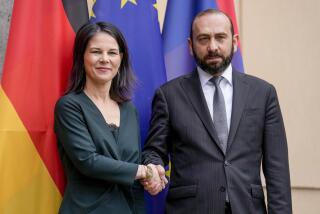German Unity Talks Approved : Europe: Two halves of defeated nation and World War II victors move toward final peace settlement. Security concerns of neighboring states will be discussed.
- Share via
OTTAWA — The Big Four victors of World War II and the two halves of defeated Germany agreed here Tuesday to begin historic talks “shortly” to reunify Germany and to discuss the security concerns of neighboring states.
After a frenetic day of bilateral talks among their foreign ministers, the six nations issued a brief statement that, however vague, begins a process that will finally lead to a peace settlement with Germany 45 years after the end of the war. With a defeated Germany divided into zones of occupation in 1945, no peace treaty was ever signed to formally end the war.
The statement was the product of an almost nonstop flurry of meetings between the foreign ministers involved in the reunification issue.
The statement, developed on the basis of a draft proposed by Secretary of State James A. Baker III, said that after talks among the Soviet Union, Britain, France, the United States and the two Germanys here, they agreed that the foreign ministers of the two Germanys would meet with the foreign ministers of the Big Four “to discuss external aspects of the establishment of German unity, including the issues of security of the neighboring states.”
“Preliminary discussions at the official level will begin shortly,” it concluded.
The Soviet Union held out adamantly against setting a date for starting reunification talks between the two Germanys, Soviet spokesman Vitaly I. Churkin said. The Western allies wanted the communique to call for talks to begin immediately after elections scheduled in East Germany for March 18. That vote is expected to oust the Communist-led government of Prime Minister Hans Modrow.
But Moscow apparently wanted to avoid casting any doubt on the legitimacy of Modrow’s government in the election campaign by implying that it would not survive. And it has also wanted to slow down the reunification process as much as possible.
The Soviets also oppose a plan offered by West German Foreign Minister Hans-Dietrich Genscher to keep a reunified Germany in the North Atlantic Treaty Organization, while pledging that no NATO forces would move onto the territory that is now East Germany. That plan is supported by the Western allies.
Tuesday’s announcement made no mention of NATO membership, nor were any other security issues cited.
The meetings began early Tuesday almost in full view of the “open skies” conference that had brought the foreign ministers here. The conference, called to prepare a treaty for the peaceful overflights by military aircraft of territory of the opposing blocs, is being attended by the top diplomats of all 23 NATO and Warsaw Pact nations. German reunification and disputes over conventional force cuts in Europe pushed the conference far into the background, however.
Baker and Genscher first met privately for 10 minutes in the morning; then Baker and Shevardnadze met along one side of the conference hall. Genscher and Shevardnadze met for more than two hours, so long that Genscher had to cancel a scheduled meeting with his East German counterpart, Oskar Fischer.
British Foreign Minister Douglas Hurd said he had been meeting continuously with Baker and Genscher as well as with French Foreign Minister Roland Dumas.
Emerging from one meeting, Hurd said the Soviets and the Western powers, including West Germany, were “quite close” to agreement on the reunification procedure.
Hurd also disclosed that Poland and Hungary had both rejected the Soviet demand that a unified Germany be neutral, despite earlier Soviet claims that its position was the Warsaw Pact view.
“There is no joint Warsaw Pact position on anything--not on anything,” said one East European source.
In mid-afternoon, Genscher met again with Baker to consult over a U.S. draft of a joint statement that said the Big Four powers and the two Germanys “agree to meet shortly after the March 18 elections” in East Germany. It added that the six ministers will “discuss external aspects of German unification,” presumably including the key security consideration of whether Germany will remain a NATO member.
Amid the almost feverish meetings, Genscher addressed the open skies conference, explaining Bonn’s policy on reunification, which his spokesman said could occur as early as next fall.
“We seek German unification in the context of integration in the European Community, the CSCE (Conference on Security and Cooperation in Europe) process, East-West partnership for stability, the building of the common European house and the creation of a peaceful order throughout Europe,” he said, notably omitting any mention of NATO.
Genscher said Soviet President Mikhail S. Gorbachev told him and West German Chancellor Helmut Kohl in Moscow last week that “unity of the German nation can only be decided by the Germans themselves and that they must themselves choose in what political forms, in what periods, at what pace and under what conditions they will realize their unity.”
“We Germans are aware of the historical dimension of this (reunification) process,” he said, adding that Germans remember “all the suffering inflicted on other nations in the name of Germany.”
He promised that “Germans united in freedom and democracy will contribute to a better Europe.”
Reunification, he continued, involves only East and West Germany and Berlin.
“We do not have territorial claims against any of our neighbors,” he said. “We respect the rights and responsibilities of the Four Powers with regard to the whole of Germany.”
Meanwhile, Associated Press reported from Brussels that an adviser to Mikhail S.Gorbachev said Tuesday that some East European nations may eventually leave the Warsaw Pact. Marshal Sergei Akhromeyev, former Soviet chief of staff, did not say which ones might leave.
More to Read
Sign up for Essential California
The most important California stories and recommendations in your inbox every morning.
You may occasionally receive promotional content from the Los Angeles Times.













